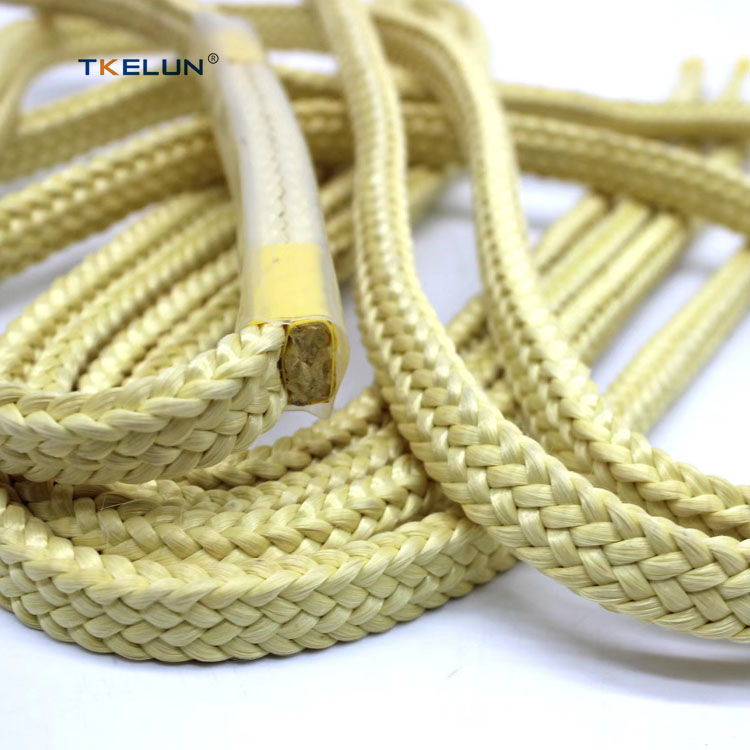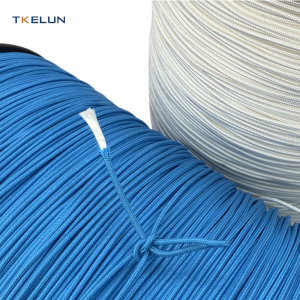Para-aramids (e.g. Aramid 1414, Kevlar) and meta-aramids (e.g. Aramid 1313, Nomex) belong to the same group of aromatic polyamide fibers, but there are essential differences between them in terms of their molecular structure, physical properties, and application areas. The following are specific points of differentiation:
I. Molecular structure and arrangement
Para-aramid (PPTA)
- The molecular chain is a rigid planar rod, polymerized from p-phenylenediamine and p-phenylenedicarbonyl chloride, the benzene ring and the amide bond form a strong conjugation effect, and the rotation within the molecular chain is blocked.
- Highly ordered crystal structure, hydrogen bonding along the fiber axial arrangement.
Meta-aramid (PMIA)
- The molecular chain is flexible and jagged, condensed from m-phenylenediamine and m-phenylenedicarbonyl chloride, with covalent bonding without strong conjugation effect, and the chain segments can be rotated moderately.
II. Physical Properties Comparison
| Features | Para-aramid | Meta-aramid |
| Strength and Modulus | Bulletproof vests, helmets, Tensile strength ≈ 5-6 times of steel wire (>20GPa), modulus >100GPa | Medium strength, modulus 30-50GPa, flexibility is better. |
| Temperature Resistance | Thermal decomposition temperature ≈ 560 ℃, 230 ℃ shrinkage rate is zero | Thermal decomposition temperature 400-450 ℃, 200 ℃ long-term strength to maintain 90% |
| Flame Retardancy | Ultimate oxygen index ≈ 28%, self-extinguishing from fire. | Ultimate oxygen index>28%, no melt drop and carbonization heat insulation |
| Chemical Stability | Strong acid and alkali resistance, strong corrosion resistance | Weak chemical resistance, susceptible to concentrated acid erosion |
| Electrical Insulation | — | Breakdown voltage>20kV/mm, outstanding insulating properties |
III. Core application areas
Para-aramids → High-strength structural scenes
- Ballistic protection: bulletproof vests, helmets (e.g. Kevlar)
- Industrial reinforcement: tire cord, ship cables, fiber optic cable reinforcements
- Aerospace: wing skins, rocket engine cases
Meta-aramid → High-temperature flame retardant scene
- Protective equipment: firefighting suits, arc protective clothing (e.g. Nomex)
- High-temperature industry: high-temperature filter felts, electrical insulation paper, heat-resistant conveyor belts
- Specialty materials: flame retardant honeycomb structures, flame retardant layers for aircraft interiors
Summary of key distinctions
| Features | Para-aramid | Meta-aramid |
| Structural features | Rigid straight bar,high crystallinity | Flexible serrated, low crystallinity |
| Core strengths | Ultra-high strength + high temperature resistance | Intrinsically flame retardant + electrically insulating |
| Typical products | Kevlar ballistic protection layer, tire reinforcement layer | Nomex firefighting clothing, insulating paper |
They are not interchangeable: para-aramids are the “gold standard” for extreme mechanical scenarios, while meso-aramids are irreplaceable in the field of fire protection and thermal insulation.
Last!!
We accept customized the materials, width, thickness,color and length. For more technical information, please contact me.
Contact: Zoey Yuan
- Email: tksales003@tkelun.com
- Whatsapp/Wechat/Tel :+86 13267352530


